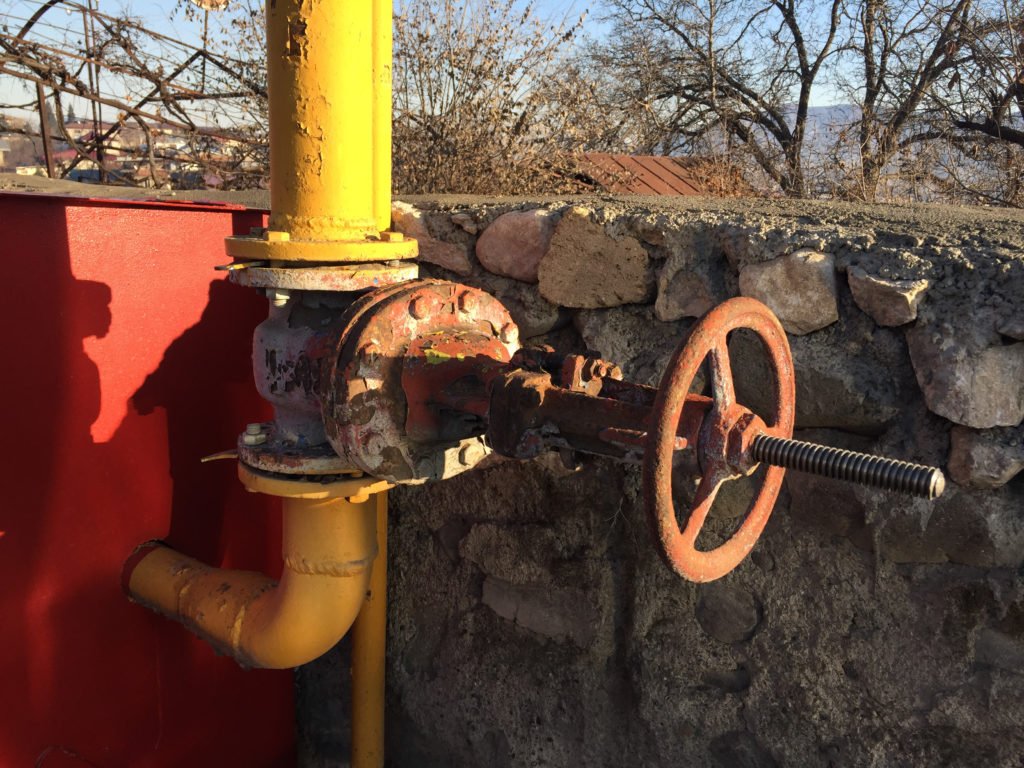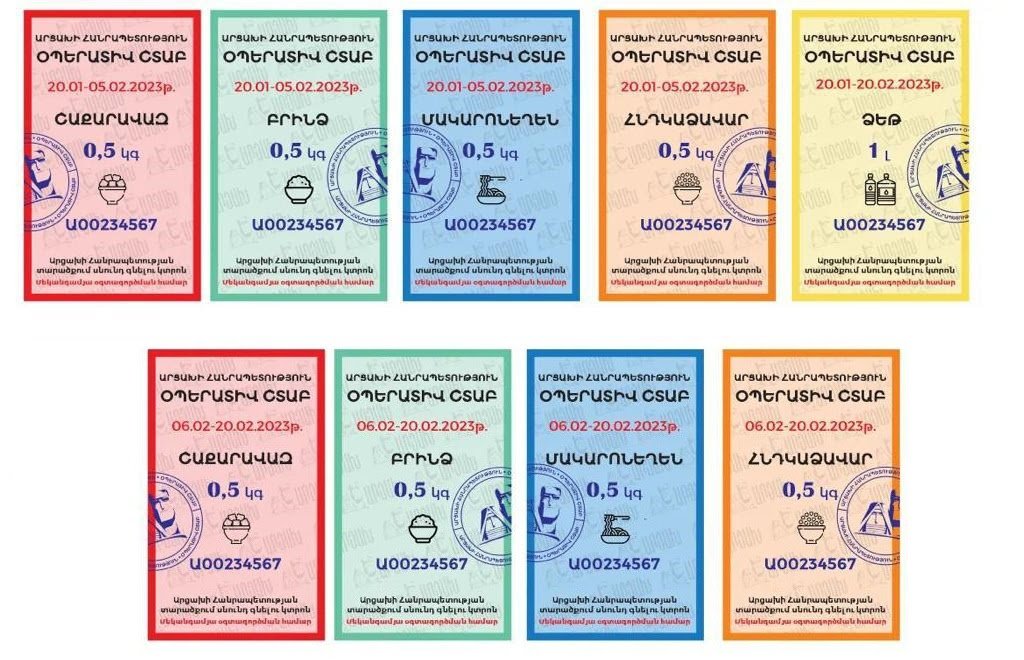
Gas supply to Artsakh has been cut off for the second time since the start of the blockade, amid disruptions to electricity and Internet connectivity.
ArtsakhGaz said that Azerbaijan disrupted the pipeline that carries natural gas to Artsakh on the afternoon of January 17. The gas supply operator said that the gas flow was restored six hours later, yet cut off again on the morning of January 18. Artsakh households have consequently been deprived of heating and hot water amid frigid temperatures.
“The ongoing blockade of Artsakh organized by the Azerbaijani authorities, creation of unbearable living conditions for the people and aggravation of the humanitarian crisis are aimed at one goal—to destroy the people of Artsakh as such by cleansing Artsakh of Armenians,” the Artsakh Foreign Ministry said in a statement about the gas supply disruption.
Artsakh has been under blockade by Azerbaijan since December 12. Government-sponsored Azerbaijani protesters posing as eco-activists have shut down the Lachin Corridor, the sole route connecting Artsakh with Armenia and the outside world, for nearly 40 days. Meanwhile Artsakh’s access to critical utilities has been periodically obstructed, leaving its 120,000 Armenian residents without gas, electricity or Internet.
Under the ceasefire agreement ending the 2020 Artsakh War, Azerbaijan must guarantee “traffic safety along the Lachin Corridor of citizens, vehicles and goods in both directions.” Russian peacekeepers were also deployed to the Lachin Corridor to ensure its safety.
The gas supply to Artsakh was previously shut off on December 13, the day after the start of the blockade. It was restored three days later.
Artsakh receives its natural gas supply from Armenia through a single pipeline that runs parallel to the Lachin Corridor. Parts of the pipeline traverse territories controlled by Azerbaijan following the cession of land after the 2020 Artsakh War.
Artsakh’s electricity supply has also been disrupted. On January 17, Artsakh authorities increased the length of the rolling blackout from two to four hours in order to conserve the limited electricity reserve, leaving Artsakh households without electricity for a part of each day.
The high-voltage power line that provides Artsakh’s electricity supply from Armenia was damaged on January 9. The “accident,” as Artsakh authorities called it, took place near the town of Lachin, which is under Azerbaijani control.
Artsakh authorities say that Azerbaijan has prohibited repair crews from accessing the power line. The government has been drawing from Artsakh’s local generating stations for electricity.
Internet access was also blocked for over 24 hours starting on January 12. The cable that provides Artsakh with Internet connectivity was damaged along the Stepanakert-Goris highway, where the Azerbaijani protesters have been blocking the Lachin Corridor. Armenian technical specialists were allowed to repair the cable and restore service on the evening of January 13 following the mediation of the Russian peacekeeping force.
In addition to the interference with critical utilities, Artsakh is also facing severe shortages of food and medicine due to the blockade. Artsakh usually receives about 400 tons of essential goods, including food and medicine, from Armenia along the Lachin Corridor every day, according to Artsakh authorities.
The Artsakh government has implemented a coupon system to conserve the food supply and equitably distribute food to households. Each resident will receive nine coupons to purchase one kilogram of rice, pasta, buckwheat and sugar and one liter of oil per month. Coupons will be eligible for use starting on January 20.

Pharmacies are running low on critical medicine, including antibiotics, insulin syringes and fever-reducing medications. Essential goods for infants, including baby formula, baby food and diapers, are also limited in supply.
Many schools have temporarily closed due to the food shortage. Artsakh authorities say that 6,828 children cannot attend school, since 41 kindergartens, 56 preschools and 20 day schools are not operational.
At least 3,900 Artsakh residents are currently unemployed as a result of the blockade, since 726 businesses have been forced to close their doors.
The blockade has also restricted access to medical services. Since planned surgeries have been temporarily suspended in Artsakh hospitals, 445 residents have been unable to receive necessary medical treatment. The International Committee of the Red Cross has facilitated the transfer of 28 patients from Artsakh to Armenia for treatment since the start of the blockade.
Russian authorities explicitly called for the reopening of the Lachin Corridor for the first time this week.
Russian Foreign Minister Sergey Lavrov called on the government of Azerbaijan to reopen the route during a phone call with his Azerbaijani counterpart Jeyhun Bayramov on January 17. Lavrov “stressed the need for the soonest complete unblocking of traffic along the Lachin Corridor,” according to a readout of the call by the Russian Foreign Ministry.
The United States and France have previously condemned the closure of the Lachin Corridor, which they explicitly attributed to Azerbaijan. Meanwhile Armenian authorities have been critical of what they see as Russia’s inaction in response to the blockade of Artsakh, including the failure of the Russian peacekeeping force to remove the Azerbaijani protesters from the corridor or reopen the route. Armenian Prime Minister Nikol Pashinyan called the Russian peacekeeping mission a “silent witness to the depopulation of the Nagorno-Karabakh region” on December 29.
Lavrov said that the Lachin Corridor will likely be reopened soon, during a press conference on January 18. He said that representatives from Azerbaijan and Artsakh and the commander of the Russian peacekeeping mission in Artsakh met this week.
“I think the issue will be settled very soon,” Lavrov said.
Artsakh President Arayik Harutyunyan confirmed that Russia had mediated a meeting with the Azerbaijani side on January 15. Yet Harutyunyan reported that “no progress was made” toward reopening the Lachin Corridor.
Meanwhile, the Azerbaijani protesters harassed a group of Armenian children returning home to Artsakh in a Russian vehicle on Tuesday night.
The 19 children were among the approximately thousand other Artsakh residents who have been stranded and unable to return home due to the closure of the Lachin Corridor. The Russian peacekeeping mission obtained the permission of the Azerbaijani side to escort the children from Armenia to Artsakh on January 17.
The Azerbaijani protesters shouted at the car and forced it to stop on the road. A group of masked protesters entered the car and filmed the children, who were visibly afraid. One of the children fainted from fear.
Azerbaijani media outlets have circulated the footage of the children as evidence that the Lachin Corridor is open for travel.
“The ethnic hatred of Azerbaijanis towards Armenians knows no boundaries, targeting even minor children,” Artsakh Ombudsman Gegham Stepanyan said in a statement about the incident.



The enemy will do what the enemy does and that is to harm and disrupt lives. That is why it is called an enemy. What the criminal leadership of Soviet-invented artificial Azerbaijan does in no way surprises me at all. What does surprise and baffle me however is the incompetence and short-sightedness of our leaders. They had thirty years to assure these critical services were in full control of the Armenian side but apparently did nothing to secure them either by relocating them or making sure none of these services would ever find themselves in control of the enemy. Then again, not much can be expected from some of our leaders who to this day refer to the enemy (թշնամի or դուշման in their lingo) as an adversary (հակառակորդ) instead. An adversary is someone against whom you compete in an event. An enemy is someone who wants to destroy you. That is just unbelievable!
Armenia for all intents and purposes have to come to the realization that they have no say on what goes on in Artsakh. Russia is the altimate lynchpin there now. For all intents and purposes Artsakh is no different from russian puppet states in Ukraine, Georgia and Moldova, and the only reason Russia has those is to increase its influence on the host country in this case Azerbaijan.
Every inch of Armenian territory is literally sacred to all true and patriotic Armenians. I’m sure that can’t be said of the Russians. They have wedged themselves in-between the indigenous Armenians and the undesirable Azerbaijani occupiers because of their own self-interests. They have reestablished themselves in the region after thirty years of absence and are playing both sides to continue to remain and rule over the region. I have no doubt their leadership to this day considers this region as Russian territory despite the Soviet collapse and disintegration. They consider their former Soviet republics as independent states on paper only. In reality, as evidenced by the situation in Ukraine, they act like these states are obligated to consider Russian points of view and interests by every move they make. Those acting submissive to Russia are rewarded and those who don’t are punished with different methods.
I agree with you that if Russia wanted it could unblock that road in a matter of hours. Road blockade is their way of punishing people who stray away from the Russian domination and act independently and purely in the interests of their own people. At the same time, Russia is rewarding Azerbaijani criminals for allowing EU-sanctioned Russian oil & gas be sold to EU through Azerbaijan. It is all about business for them and the last thing they could care about is how the blockade affects the daily lives of the Artsakh Armenians. But still at the end of the day I put the lion’s share of the blame on our current incompetent leaders who, having known the Russians and their politics for decades, don’t seem to know how the Russian politics work and how to act to have them on our side instead. Russians could care less if a million Armenians or Azerbaijanis suffer as long as their interests in the region are not compromised. For example, when the Russian president Putin seemingly and irresponsibly associated ‘Karabakh’ with Soviet-invented artificial Azerbaijan at the end of 2020 war, what he really meant was that to make the now-defunct Soviet Union or something equal to that a reality because he considers Soviet collapse a Russian tragedy, the Armenian Artsakh must lay within artificial Azerbaijan boundaries. His statement was not pro-Azerbaijani at all. It was pro-Russian only because that was Russia’s former reality!